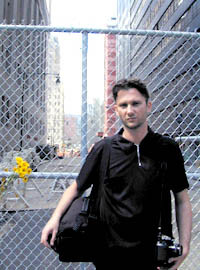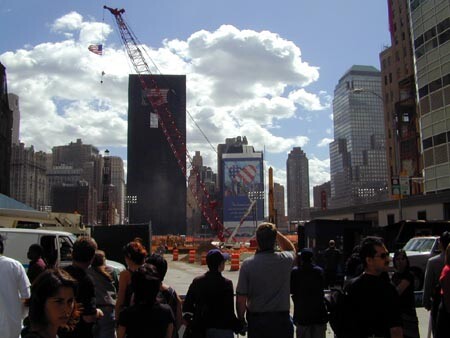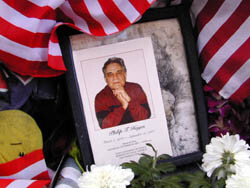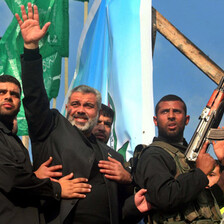The Electronic Intifada New York City 11 September 2002

The Electronic Intifada’s Nigel Parry, at Ground Zero in NYC, 11 September 2002.
Those who perpetrated the attacks and those who lead the American people ironically seem to share the same belief that this was an ‘attack against America’. Yet what is undeniably clear is that the victims included people of all races, religions, and backgrounds. People of 60 nationalities were counted among the dead of the World Trade Center attacks. New York itself, of course, is one of the most ethnically diverse cities in the world. This was not an attack focused on America or Americans as much as it was an unfocused attack on human beings, on people like me and you.
The tendency to construct simplicities to justify both action and reaction is a very human trait. Those who made a vast graveyard out of this place sought to present the immeasurable pain unleashed on the tens of thousands of friends, relatives and colleagues of those killed as part of a ‘war’ against a monolithic enemy that cares nothing of individuals, that did not respect cultures and traditions valued by the attackers, that ‘deserved what it got’. The multicolored sea of faces which daily pour through New York’s streets underlines very clearly how the perpetrators themselves personified the same spirit they claimed to reject.

New Yorkers and visitors to the city standing on the edge of the site, 11 September 2002.
The mourning in America since September 11th, 2001, has been hard to watch. There has been so much of it, so many words written and spoken, so many candles lit. It has been packaged and recycled by the media and this has, at times, verged on crass exploitation. Yet this does not cancel out the fact that it is important for peoples to process loss and grief in whatever ways that work for them. No one should begrudge America its time of tears and sadness, or the heros that this tragedy produced.
It is also true that the intense mourning and focus on these events has highlighted a corresponding denial and ignorance that surrounds similarly unjustifiable acts of violence and suffering elsewhere in the world. The systems of power and political fault lines that seem disturbingly prepared to allow conflicts such as that between the Israelis and Palestinians to continue must ultimately be examined, understood, and addressed. No conflicts are truly local in our interconnected world.
What 9/11 and its aftermath have highlighted is that we have not paid attention to our fellow humans. If there is one single resolution that September 11th cries out for, it is that we must ensure that violence does not become a primary mode of dialogue in the world history yet to be written. Unless we actively seek peace, conflict and war will be the default state we will reap.

A memorial photograph for Philip Hayes, just one of the estimated 3,025 victims of the attacks, attached to the fence surrounding St. Paul’s church, bordering the site.
Related link: Here is New York - an exhibition of photos of the WTC, the attack, and its aftermath.



